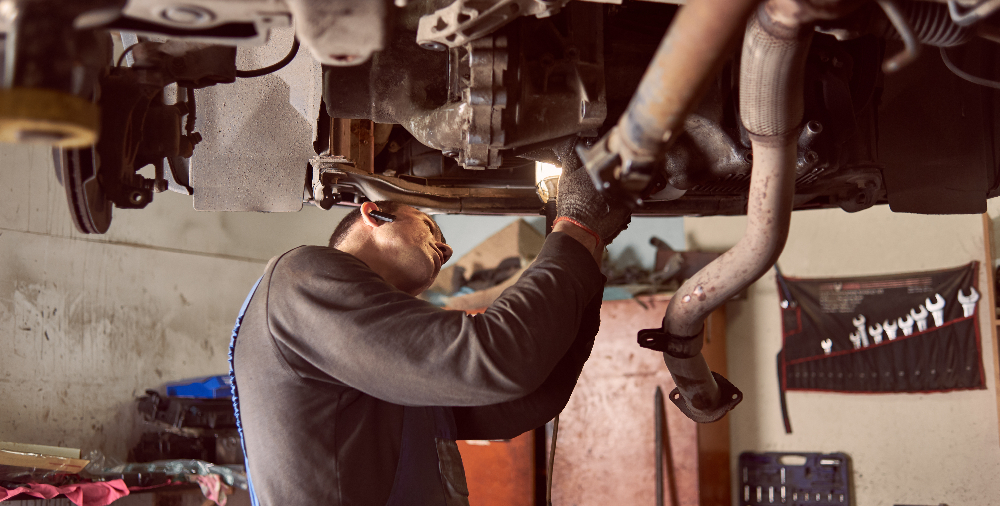Any gearhead or driver knows how important your vehicle’s exhaust system is. After all, it’s responsible for reducing noise, converting harmful gasses, and improving performance. So, if the exhaust system isn’t functioning correctly, specifically if it’s leaking fluids, then your performance and fuel economy will negatively be affected.
The Basics of the Exhaust System
The exhaust is made up of 3 major components: exhaust manifold, catalytic converter, and muffler. These 3 exhaust components work together to ensure the system’s running properly. The process starts with the manifold near the engine and then gasses, which are converted at the catalytic converter, are transferred through to the back of the vehicle.
This system also includes a flex pipe, oxygen sensors, gaskets and clamps, and resonator pipe accessories. So needless to say, there’s a lot that goes into the exhaust system and its success. With all of these individual parts, it can also be difficult to keep track of how well each part is operating; and more importantly, to track how long the exhaust system will last. An exhaust system’s complexity is another great reason to get annual, thorough inspections for your vehicle.
What Does an Exhaust Leak Mean?
Exhaust leaks are no joke. Unlike a flat tire or dead battery, exhaust leaks are more complicated. It can be difficult to identify its cause and then fix the root problem.
An exhaust leak occurs when gasses that are produced during engine combustion leak out before reaching the tailpipe. As mentioned above, a healthy vehicle emits all of its exhaust gasses out the tailpipe.
Exhaust leaks are problematic for three primary reasons. Because the gasses that leak out likely aren’t safe enough to be released into the environment, leaks can pose a risk to the environment. Likewise, an exhaust leak can be a risk to the vehicle’s driver and passengers. In terms of vehicle performance, exhaust leaks are detrimental because they can obscure a car’s sensors. As a result, the engine might burn too much or not enough fuel.
Exhaust Leaks and Performance
The exhaust system’s effectiveness has a direct effect on vehicle performance. How well the exhaust can convert and pass gasses through the tailpipe, the less the car has to work and the better it performs. Therefore, an exhaust leak will negatively affect performance. An unhealthy exhaust system (one that’s leaking) works harder and doesn’t function at 100%. And, the leaks can throw off sensors, which communicate proper fuel signs to the engine.
Signs of an Exhaust Leak
Unfortunately, you might not notice you have an exhaust leak right away. With intricate car parts like this, it might not be totally visible until something drastic happens with your vehicle (like breaking down) or it’s caught in a mechanic’s inspection. But here are a few signs to look out for to see if your car’s exhaust might have a leak:
- Whistling noises
- Excessive vibrations
- Poor fuel economy (Because after all, fuel efficiency and an exhaust go hand-in-hand, too. Especially if the exhaust is a custom exhaust.)
- Check engine light
- Or a rattling noise near the catalytic converter
Don’t Fall Victim to Exhaust Problems. Transform Your Vehicle
The last thing you want to put off is an exhaust leak and let that problem turn into something greater. When that happens, you end up needing a full-scale exhaust repair or replacement. And if you’re curious for signs you should replace your exhaust, we’ve got you covered too. So what can you do to get ahead of any problems? Upgrade your exhaust with aftermarket alterations. The benefits of a custom exhaust will have you and your vehicle soaring. The Performance Muffler team has been specializing in custom exhaust work since 2007. And we’re proud to call ourselves a top shop in the Phoenix area. Plus, we’ve grown to add locations in Peoria and Glendale.

